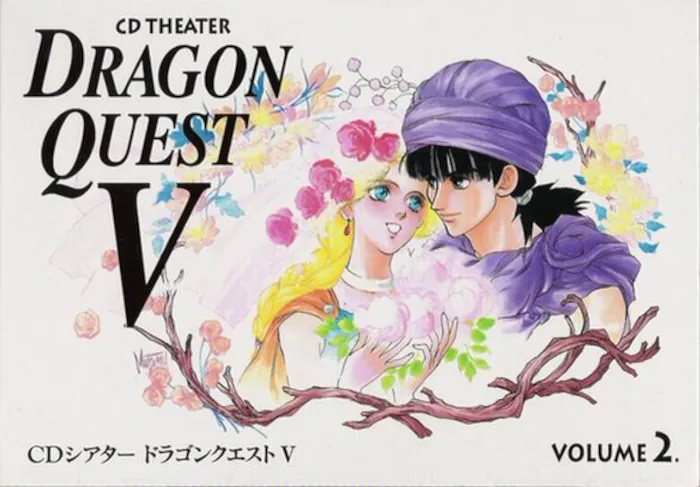It was over 15 years ago that I got my hands on the CD Theater albums for Dragon Quest I and Dragon Quest II. I knew precious little about drama CDs back then, so I don’t think I totally understood that what I had in my hands was special. Not only did these “CD Theater” albums come with beautiful artbooks, but they included newly-arranged music by Koichi Sugiyama’s de facto protégé, Hayato Matsuo. Sadly, you will never find this music isolated outside of the dialogue and sound effects of these drama CDs, though some tracks on these albums do offer unmitigated sections of music, particularly in the first and last tracks of each album. Nonetheless, as a poor monolingual English-speaker, I almost wish someone would “fansub” these drama albums so I could read in English what I’m hearing in Japanese.
In CD Theater Dragon Quest V Vol.2, the hot topic is marriage. Or, to quote The Princess Bride, “Mawwiage. Mawwiage is what bwings us togevah today! That bwessed awwangement…”
Okay, you get it. Honestly, though, just look at the tracklist: this middle section is officially the slow part. Yes, there are some adventures and some big battles. But, for the most part, Volume 2 is about the hero marrying Bianca (apparently the canon choice for marriage), and there’s a coronation ceremony not long down the road. But, then again, the album ends with our heroes scaling “The Demon Tower.” Things may not end well for the hero and his lovely bride…
There’s a lot of exceptional music, and the voice acting is great because there is such a diverse cast of minor characters, many of whom are gracious enough not to overact their minor roles. So you can hear the music and still get a sense for whether the conversation is pleasant, tense, awkward, angry, or something else. Yes, it is a unique experience listening to these foreign-language drama albums. We are not the intended listener base…or rather, I am not. You might know Japanese, in which case, good on you. You’ll enjoy this more than I did.
As I said about the DQIV trilogy, if you’re going to own any volume in this set, you may as well own them all. I think that Vol.2 is probably the most reliably enjoyable to listen to from a musical perspective, but it only really works if you have all three volumes, especially if you want to fully appreciate what Hayato Matsuo did with the DQV score.




